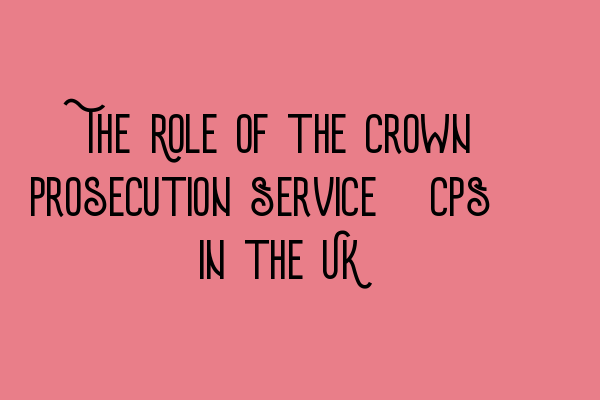The Role of the Crown Prosecution Service (CPS) in the UK
Welcome to the SQE Criminal Law & Practice Law UK blog. In today’s post, we will discuss the important role of the Crown Prosecution Service (CPS) in the UK criminal justice system.
The Crown Prosecution Service (CPS) is a key institution responsible for prosecuting criminal cases in England and Wales. As a solicitor in the UK, it is essential to understand the functions, responsibilities, and significance of the CPS.
The primary role of the CPS is to review and evaluate evidence gathered by the police and other law enforcement agencies. They decide whether there is sufficient evidence to charge a suspect and proceed with a criminal prosecution. This decision is made independently and impartially, based on the Code for Crown Prosecutors.
The Code for Crown Prosecutors sets out the evidential and public interest tests that the CPS must apply when determining whether to prosecute a case. It ensures that a case is not pursued if the evidence does not meet the required standard or if it is not in the public interest to do so.
The CPS works closely with the police to ensure that investigations are conducted properly and thoroughly. They provide legal advice and guidance to the police at all stages of the investigation, including advice on arrest, search and seizure, and gathering evidence.
In addition to deciding whether to charge a suspect, the CPS also plays a crucial role in the pre-trial process. They prepare and present the case in court, advocating the interests of the public and victims of crime. The CPS works closely with barristers, witnesses, and experts to ensure that the evidence is presented effectively and that the case is prosecuted fairly.
Furthermore, the CPS is responsible for making decisions on behalf of the state, such as discontinuing a case or offering a plea bargain. They may also represent the state in appeals against sentences considered unduly lenient.
It is important to note that the CPS operates independently from the police and other agencies involved in the investigation. This independence helps maintain the integrity of the criminal justice system and ensures that decisions are made objectively, free from any undue influence or bias.
Overall, the role of the CPS is vital in ensuring that justice is served in criminal cases in the UK. Their commitment to fairness, impartiality, and the rule of law is fundamental in upholding public confidence in the criminal justice system.
